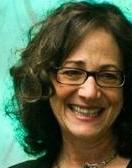It was 3 AM and I woke, cold, which, given the heat of the past weeks, seemed impossible. None of my tricks for getting back to sleep was working so I engaged in the one activity that we now know is the worst, reading on a screen where, as usual, I went straight to the obits. There Katie Hafner's extremely sad one about Lindy Hess, who ran the Columbia Publishing Course.

Photo by Lilian Kemp swiped from NYT obit (thanks)
We met Lindy in 1981 on the very day Reagan was being sworn in as president and the hostages were released in Iran. About nine months earlier, Jeff Stamps and I had sold Networking, our first joint book to Methuen, the British publisher, which was starting up an American list (for the publishing historians, Fred Jordan, for many years of Grove Press, was the publisher of this effort). The sale was thanks to Ron Bernstein, our agent at the time. But not long after we'd signed the contract, Ron called to say that Methuen's parent company in the UK had decided to cancel its plans to publish an American list. He was reassuring that he could sell the book again, which he did in very short order at a bit more than twice the original advance to...
Lindy Hess at Doubleday. It was a good break for people bringing out their first book with a major publisher. Lindy knew what she was doing. At 31, she was such a pro that the venerated old house had given her control of an imprint (Doubleday Dolphin). Because she appeared to be so knowledgeable and clearly was very talented and because we'd done the deal on the phone without meeting face-to-face, I thought she'd be much older than I. Instead, when we went to the swanky building on, was it Park Avenue, we were greeted by a woman three years younger with shoulder-length hair held back by a, was it velvet, headband that she removed and reinserted every few minutes. We talked in her office for a while about what was ahead in the process, mentioned that "Jackie Kennedy" was now an editor at Doubleday, described her as "very nice" and "hard-working," and shortly thereafter asked if I needed to use the ladies room.
We went together and, as we stood in front of the mirror fidgeting with our hair after peeing -- isn't that part of the ritual: pee, wash your hands, fuss with your hair? -- she said I looked "elegant." I was wearing a long-sleeved ivory silk blouse with a self-tie that I'd borrowed from my friend-neighbor Emily, a dark-blue, knee-length wool skirt with two unusual pleats and one pocket that was stitched not quite right (I'd gotten it at a designer-discount shop) causing me to fuss with *it* constantly, and the most expensive pair of tall boots I'd ever bought, then about five years old. It felt like quite a compliment standing with "my editor" in Manhattan.
Things went well. Lindy liked the book and, when we made a most unusual

Shortly after the book was published (my memory is that it was only weeks), Lindy left Doubleday and, if I've got this right, moved to Boston, and not long thereafter married her husband Bill Appleton. I was happy for her and sad that our acquisition editor had orphaned our book. A very nice guy took over -- Gerry Helferich -- who later went on to work at Wiley (a later publisher of Jeff's and my books) and who now writes his own books.
We saw Lindy a few times after she moved to Boston, us visting her house, she visting ours, but as time went on, we lost touch. Then about five years ago, David Miller of Garamond Agency, a new agent whom we worked with for a while, told us he was going to teach at the Columbia Publishing Course, which led to a discussion of the program and, alas, that's where Lindy had ended up, spending 25 years making that program and many of its graduates extremely successful.
Once you've been published, you can never be unpublished. There have been other people who have come along in the years since Lindy published Networking, people whose work has made a very big difference in Jeff's and my writing careers but Lindy was the first book publisher and I'd give anything at this moment to see her take that headband out and put it back in.

